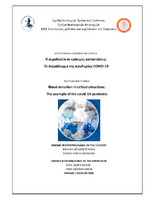| dc.contributor.advisor | Georgatzakou, Chara | |
| dc.contributor.advisor | Kriebardis, Anastasios | |
| dc.contributor.author | Θεοδωρογιάννη, Βασιλική | |
| dc.date.accessioned | 2022-10-04T06:04:30Z | |
| dc.date.available | 2022-10-04T06:04:30Z | |
| dc.date.issued | 2022-10-03 | |
| dc.identifier.uri | https://polynoe.lib.uniwa.gr/xmlui/handle/11400/2961 | |
| dc.identifier.uri | http://dx.doi.org/10.26265/polynoe-2801 | |
| dc.description.abstract | Η ανάγκη για αίμα είναι ένα πρόβλημα που αντιμετωπίζεται από όλες τις χώρες σε όλο τον κόσμο, αλλά φαίνεται ότι αποτελεί μεγαλύτερη πρόκληση για τις περισσότερες ανα-πτυσσόμενες χώρες κυρίως λόγω της έλλειψης ανθρώπων που είναι πρόθυμοι να δώ-σουν αίμα και της έλλειψης ενός αποτελεσματικού συστήματος αιμοδοσίας. Το πρόβλη-μα της έλλειψης αιμοδοτών κατά τις κρίσιμες κοινωνικές καταστάσεις είναι παγκόσμιο. Συγκεκριμένα, στην παρούσα έρευνα διερευνάται ο αντίκτυπος της πανδημίας στην πρόθεση αιμοδοσίας των Ελλήνων κατά τη διάρκεια της πανδημίας COVID-19.
Η παρούσα μελέτη είναι ποσοτική με χρήση ερωτηματολογίου με 28 κλειστές ε-ρωτήσεις με δομή τύπου Likert και μια ανοιχτή ερώτηση. Το δείγμα αποτελείται από 764 συμμετέχοντες / συμμετέχουσες εκ των οποίων 125 δεν είχαν δώσει ποτέ αίμα για ο-ποιοδήποτε λόγο. Η επιλογή του δείγματος ήταν τυχαία.
Το δείγμα αποτελείτο από γυναίκες σε ποσοστό 63%. Το 67% ήταν κάτω των 40 ετών και σε ποσοστό 74% κατοικεί στην Αθήνα. Το 84% είχε ήδη δώσει αίμα τουλάχιστον μια φορά. Το 48% από τους αιμοδότες είναι τακτικοί αιμοδότες. Όμως το 63% εξ αυτών δεν έδωσαν καθόλου αίμα κατά την πανδημία. Το 43% δήλωσε ότι η πανδημία επηρέασε αρνητικά την αιμοδοσία τους. Από αυτούς το 83% μείωσαν κατά πολύ τις αιμοδοτήσεις τους και το 72% συγκεκριμένα λόγω φόβου του ιού, αλλά δήλωσαν σε ποσοστό 83% ότι θα επανέλθουν στις αιμοδοτήσεις και πάλι μετά την πανδημία με τον ρυθμό που είχαν πριν από αυτήν. Σε ποσοστό 49% δήλωσαν ότι μια υλική αμοιβή δεν θα τους ενθάρρυνε να αιμοδοτούν περισσότερο. Όμως σε ποσοστό 67% πίστευαν ότι η παροχή γινόταν δω-ρεάν έλεγχος αντισωμάτων έναντι του SARS-CoV-2 θα τους ενθάρρυνε να αιμοδοτούν συχνότερα.
Τα ευρήματα της έρευνας επαλήθευσαν τα ευρήματα της βιβλιογραφίας επί του θέματος διεθνώς. Η αιμοδοσία είναι μια πράξη που γίνεται βασικά εθελοντικά και μια υγειονομική βελτίωση στους χώρους αιμοδοσίας αλλά και κάποιες παροχές – με προε-ξάρχουσα την παροχή δωρεάν ελέγχου αντισωμάτων έναντι του SARS-CoV-2 – θα μπο-ρούσαν να βελτιώσουν σημαντικά την κατάσταση – ακόμη και σε κρίσιμες καταστάσεις όπως η πανδημία. | el |
| dc.format.extent | 60 | el |
| dc.language.iso | el | el |
| dc.publisher | Πανεπιστήμιο Δυτικής Αττικής | el |
| dc.rights | Αναφορά Δημιουργού - Μη Εμπορική Χρήση - Παρόμοια Διανομή 4.0 Διεθνές | * |
| dc.rights | Attribution-NonCommercial-NoDerivatives 4.0 Διεθνές | * |
| dc.rights | Attribution-NonCommercial-NoDerivatives 4.0 Διεθνές | * |
| dc.rights.uri | http://creativecommons.org/licenses/by-nc-nd/4.0/ | * |
| dc.subject | Covid-19 | el |
| dc.subject | Αιμοδοσία | el |
| dc.title | Η αιμοδοσία σε κρίσιμες καταστάσεις: Το παραδειγμα της πανδημίας COVID-19 | el |
| dc.title.alternative | Blood donation in critical situations: The example of the covid-19 pandemic | el |
| dc.type | Μεταπτυχιακή διπλωματική εργασία | el |
| dc.contributor.committee | Georgatzakou, Hara | |
| dc.contributor.committee | Kriebardis, Anastasios | |
| dc.contributor.faculty | Σχολή Επιστημών Υγείας & Πρόνοιας | el |
| dc.contributor.department | Τμήμα Βιοϊατρικών Επιστημών | el |
| dc.contributor.master | Βιοϊατρικές Μέθοδοι και Τεχνολογία στη Διάγνωση | el |
| dc.description.abstracttranslated | The need for blood is a problem faced by all countries around the world, but it seems to be a bigger challenge for most developing countries mainly due to the lack of people will-ing to donate blood and the lack of an efficient blood donation system. The problem of the lack of blood donors during critical social situations is global. Specifically, this re-search investigates the impact of the pandemic on the intention to donate blood in Greece during the COVID-19 pandemic.
The present study is quantitative using a questionnaire with 28 closed questions with a Likert type structure and one open question. The sample consisted of 759 people. The findings of the present study highlight the importance of voluntary blood donation and suggest some incentives that can promote voluntary blood donation in Greece.
The sample consisted of 63% women. 67% below were 40 years old and 74% live in Athens. 84% had already given blood at least once. 48% of blood donors are regular blood donors. But 63% of them did not give blood at all during the pandemic. 43% said the pandemic had negatively affected their blood donation. Of these, 83% greatly reduced their blood donations and 72% specifically because of fear of the virus, but 83% stated that they would return to blood donations again after the pandemic at the rate they had before it. 49% stated that a material reward would not encourage them to donate blood more. But 67% believed that providing a free SARS-CoV-2 antibody test would encourage them to donate blood more often.
The findings of the research verified the findings of the literature on the subject internationally. Donating blood is basically a voluntary act, and a sanitary improvement in blood donation sites and some benefits – notably the provision of free antibody testing against SARS-CoV-2 – could significantly improve the situation – even in critical situations such as the pandemic. | el |


